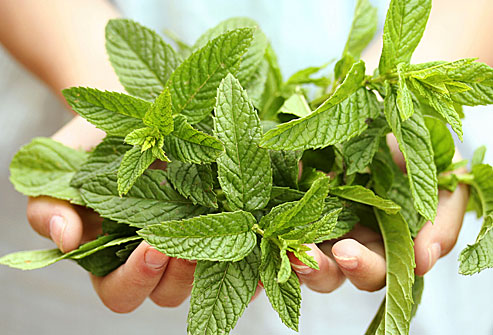- Peppermint is a plant. The leaf and oil are used as medicine.
Contents
Uses
- Common cold
- Cough
- Inflammation of the mouth and throat
- Sinus infections
- Respiratory infections.
- Digestive problems including heartburn, nausea, vomiting, morning sickness, irritable bowel syndrome (IBS), cramps of the upper gastrointestinal (GI) tract and bile ducts, upset stomach, diarrhea, bacterial overgrowth of the small intestine, and gas.
- Some people also use peppermint for menstrual problems, liver and gallbladder complaints, preventing spasms during endoscopy procedures, and as a stimulant.
- Peppermint Oil is applied to the skin for headache, muscle pain, nerve pain, toothache, inflammation of the mouth, joint conditions, itchiness, allergic rash, bacterial and viral infections, relaxing the colon during barium enemas, and for repelling mosquitoes.
- Some people inhale peppermint oil for treating symptoms of cough and colds, and as a painkiller.
- In foods and beverages, peppermint is a common flavoring agent.
- In manufacturing, peppermint oil is used as a fragrance in soaps and cosmetics, and as a flavoring agent in pharmaceuticals.
Benefits
- Peppermint oil seems to reduce spasms in the digestive tract. When applied to the skin, it can cause surface warmth, which relieves pain beneath the skin.
Cautions
- Peppermint and peppermint oil are LIKELY SAFE when taken by mouth in amounts commonly found in food, when taken in medicinal amounts, or when applied to the skin. The leaf is POSSIBLY SAFE when taken in amounts used for medicine short-term (up to 8 weeks). The safety of using peppermint leaf long-term is unknown.
- Peppermint can cause some side effects including heartburn, and allergic reactions including flushing, headache, and mouth sores.
- Peppermint oil, when taken by mouth in pills with a special (enteric) coating to prevent contact with the stomach, is POSSIBLY SAFE for children 8 years of age and older.
- Pregnancy and breast-feeding: It is LIKELY SAFE to take peppermint in amounts normally found in food during pregnancy and breast-feeding. However, not enough is known about the safety of taking larger amounts used for medicine. It’s best not to take these larger amounts if you are pregnant or breast-feeding.
- A stomach condition in which the stomach is not producing hydrochloric acid (achlorhydria): Don’t use enteric-coated peppermint oil if you have this condition. The enteric coating might dissolve too early in the digestive process.
- Diarrhea: Enteric-coated peppermint oil could cause anal burning, if you have diarrhea.
Interactions
- Peppermint has many mild to moderate interactions. Consult your doctor before using peppermint in any form. For more information on what interacts with peppermint see: Peppermint Interactions
Other Names
Black Peppermint, Bo He, Brandy Mint, Chinese Peppermint, Corn Mint, Extract of Mentha Piperita, Extract of Peppermint, Extract of Peppermint Leaves, Extract of Peppermint Leaves, Extrait de Feuilles de Menthe de Poivrée, Extrait de Mentha Piperita, Extrait de Menthe Poivrée, Feuille de Menthe Poivrée, Field Mint, Herba Menthae, Huile de Mentha Piperita, Huile de Menthe Poivrée, Huile Essentielle de Menthe Poivrée, Lamb Mint, Menta Piperita, Mentha arvensis, Mentha halpocalyx, Mentha lavanduliodora, Mentha Oil, Mentha Piperita, Mentha Piperita Extract, Mentha Piperita Oil, Mentha x piperita, Menthae Piperitae Aetheroleum, Menthae Piperitae Folium, Menthe, Menthe Anglaise, Menthe Poivrée, Menthe Pouliot, Menthe Sauvage, Menthe Verte, Menthol, Mint, Mint Balm, Oil of Peppermint, Paparaminta, Peppermint Essential Oil, Peppermint Extract, Peppermint Leaf, Peppermint Leaf Extract, Peppermint Oil, Sentebon, Western Peppermint, Yerba Buena.
References
- Source: WebMD, “Peppermint”, www.webmd.com/vitamins-supplements/
- Source: www.greenmedinfo.com/blog/power-peppermint-15-health-benefits-revealed
See Also: Peppermint Oil and Peppermint Interactions

